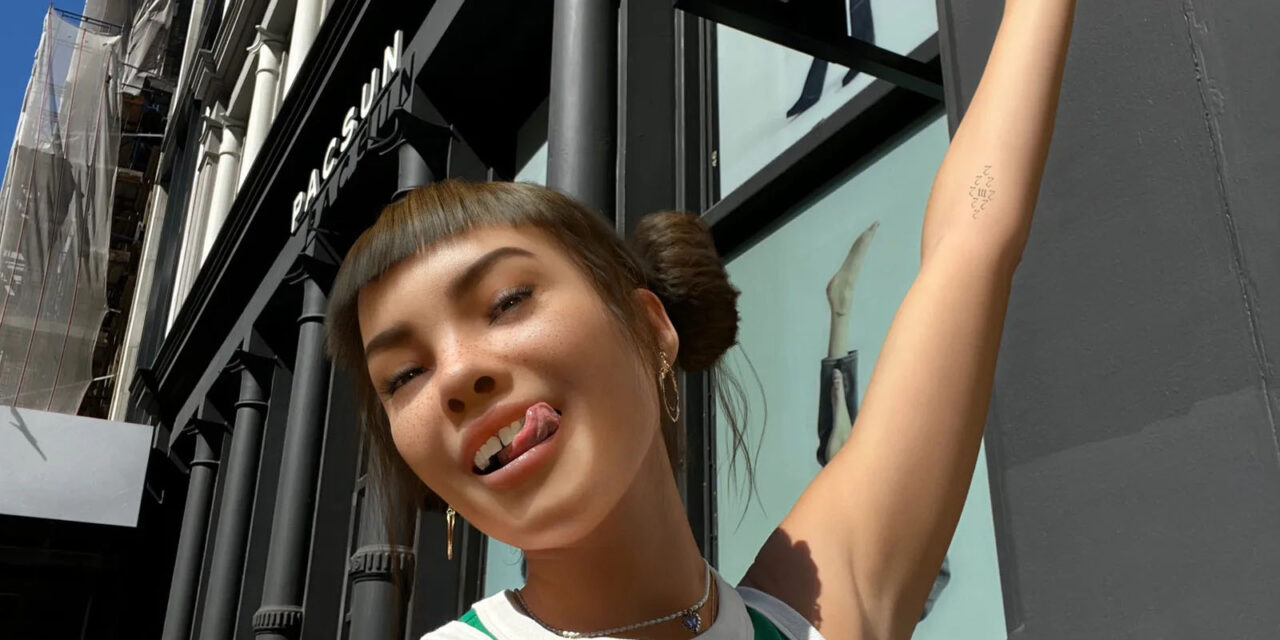Miquela is a top CGI influencer. Brands can increasingly create targeted and tailored digital influencers, according to a new report. Courtesy of Pacsun
By Tatiana Walk-Morris
Source: www.retaildive.com, September 2024
The cost, speed and quality of virtual personas are “only poised to improve as GenAI advances,” according to a PitchBook report.
Dive Brief:
- Though venture capitalists continue to invest in brands backed by human influencers, some brands and retailers are turning to virtual influencers to sway consumers, according to a PitchBook report.
- Brands like Dior, Calvin Klein and BMW have used a virtual influencer, meaning a fictional avatar, named Lil Miquela, who is approaching 3 million Instagram followers. Brud, the firm that developed Lil Miquela, was last valued at $144.5 million before it was acquired by Dapper Labs in 2021, per PitchBook’s report.
- Some companies are experimenting with bringing virtual influencers into physical stores. Cindy, another virtual personality developed by Imaginuity, was introduced at 13 shopping centers in the U.S. to drive traffic across its stores and digital properties, the report noted.
Dive Insight:
Creating virtual influencers could potentially save brands and retailers millions of dollars otherwise spent on human influencers. Their virtual personalities can be tailored to specific customers, and they aren’t limited by “working hours, unionization, and other physical and legal constraints that may factor into human influencer partnerships,” posing a risk of job displacement for influencers and further depressing wages for human influencers, PitchBook noted in its report.
Additionally, the “cost, speed, and quality of these personas are only poised to improve as GenAI advances,” per the report.
However, these digital avatars do come with some constraints. They’re better for demonstrating simple products like cosmetics, but not more complex items like sporting goods or furniture, PitchBook said in its report. Furthermore, they’re vulnerable to copyright issues, bias, deepfakes and customer manipulation, the report noted.
Though brands and retailers are turning to virtual influencers to promote their products, research indicates that consumers continue to value human influencers’ recommendations. Nearly 60% of Generation Z aspires to become an influencer, and consumer trust in influencer personalities is on par with trust with family and friends, per the report. Additionally, influencers attract private capital.
An April survey by Sprout Social found that about half of respondents make purchases daily, weekly or monthly based on influencers’ advice. However, they were split on whether they would be open to brands using AI influencers, with 37% saying they wouldn’t and the same share indicating that they would.
Some brands are continuing to rely on human influencers to garner attention from customers. In January, J.C. Penney partnered with Dallas-based fashion and lifestyle influencer LaDarius Campbell to create a limited-edition collection and promote it during a live styling event at his local J.C. Penney location. The following month, Claire’s announced its influencer platform, dubbed The Collab, which enlists Gen Z and Gen Alpha brand ambassadors.
Meanwhile, other brands are bringing together human influencers with virtual avatars to promote their products. Earlier this year, Coach brought in celebrities and virtual influencers Imma, Lil Nas X, Camila Mendes, Youngji Lee, Kōki and Wu Jinyan, as part of its “Find Your Courage” campaign. Plus, Kim Kardashian partnered with Wieden + Kennedy Portland to create clones of herself and test out her products based on criteria like support, smoothness and stretch.
In its report, PitchBook highlighted the Skims brand as one of the more successful influencer-founded brands, which was last valued at $4 billion. In addition to its digital experiments, the brand opened its first permanent store in June in Washington, D.C., and announced plans to open more locations in Florida, Texas and Georgia.
As retailers and brands explore the cost-cutting and marketing potential of virtual influencers, PitchBook’s findings suggest that venture capitalists’ interest in online retailers has declined. VC investment in e-commerce companies spiked in 2021, with 72 companies exiting at a combined exit value of $273 billion. But as of June, that figure has fallen to 28 companies exiting with only $2.4 billion, per the report.

